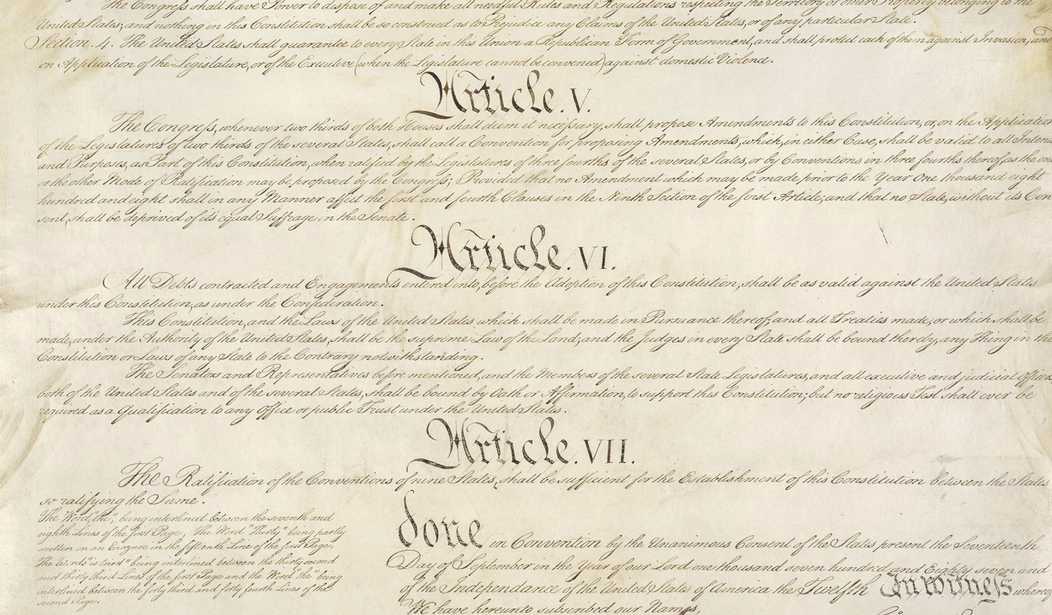You can almost set your watch by it; every few minutes, somewhere in the media world, a Democrat gets in front of a camera (one of the more dangerous places one can be is between a politician and a camera, and Democrats are particularly dangerous in this respect) and goes rambling on about "our democracy." It's almost as though, by invoking "our democracy," they can then take any ridiculous policy position, no matter how ridiculous, and expect that people will take them seriously.
Of course, because you're reading this page, you're probably already better-informed than most. You're probably already aware that the United States is not and never has been a democracy. The United States was founded as, and remains, a Constitutional Republic, with influences ranging back to the Roman Republic. But a lot of people who should know better don't seem to understand this.
This is a good take on the matter.
How many times have we heard over the last decade that Donald Trump was a threat to democracy? That we were going to lose our democracy if he isn’t restrained (and maybe even eliminated)? That our democracy is in peril because Trump and his supporters are fascists, Nazis, and worse, if anything can be?
The Democrats and their media allies hammer the term far beyond the point of absurdity. What is their obsession with “democracy,” a word that appears neither in the Declaration of Independence nor in the Constitution?
Because, as has been pointed out many times, but clearly not enough, the U.S. is not a democracy.
Our nation is a republic. The Constitution guarantees in Article IV to “every state in this union a republican form of government.” The founders were skeptical of democracies. James Madison called democracy “the most vile form of government.”
“Democracies,” he said, “have ever been spectacles of turbulence and contention; have ever been found incompatible with the personal security or the rights of property, and have in general been as short in their lives as they have been violent in their deaths.”
Madison was far from the only one of the founders to express such a sentiment. And, in addition to Article IV's guarantee, we must note that the words "democrat" and "democracy" appear nowhere in the Constitution. That's not by accident.
Now, our country does have institutions that lean towards democracy. The House of Representatives, for example, was designed to be the "people's house," with members elected directly by and (theoretically) closer to the electorate. That house was meant to be balanced by the Senate, whose members were originally intended to be selected by the legislatures of the several states, and therefore representing, not voters, but the interests of the state governments.
We also have our presidential election process, wherein we vote, not actually for the president, but indirectly for electors, who then elect the chief executive; this is the system known (but not so called in the Constitution) as the Electoral College. In fact, not even the presidential election is truly a national election; each state holds its own election, after which electors are chosen, they meet, and elect the president.
Finally, many of our several states have some form or another of a citizen's initiative system, in which citizens can, through a petition or similar system, seek to have various issues and policies added to a ballot for a direct vote. This is as close to direct democracy as we get in the United States, and it can only be done at the state or local level. The Constitution contains no provision for any such process at the federal level.
The United States remains as it was intended to be: A Constitutional Republic.
Read More: Constitutional Illiterates Howard Dean, MSNBC Host Display Their Ignorance on the Electoral College
US Senator Endorses Extra-Constitutional Means to Block Populist Candidates From Taking Office
The problem here is one of semantic infiltration. In continually describing our country as a "democracy," politicians, whether deliberately or not, gain ground in pushing for less republican (small-r) and more democratic (small-d) policies. Our republican government contains specific safeguards against direct democracy, but this semantic shift seeks to make the move away from republican principles more tolerable, less noticeable. This may be by accident, or it may be by design, but it's happening; witness that too many politicians, even Republicans, toss around the term "democracy" far too easily when referring to our national government.
The Constitution, probably the most effective governing document in the history of mankind as it was originally written, contains specific safeguards against direct democracy. The Senate is one of those safeguards. The presidential election system is another. Notice that those are two institutions that the political left in this country would like to do away with.
We do not, nor should we have, government by direct democracy. That is no more than mob rule or, as Benjamin Franklin was rumored to have said, “two wolves and a sheep voting on what’s for dinner.” We have a republic and a Constitution that clearly defines the roles and the limitations on the various branches of government. We have a Senate that was originally supposed to represent the interests of its states, and we have a system for electing our presidents to make sure that a few high-population states don’t end up dictating to the entire country.
Let’s keep it that way. And one thing we can do is to prevent, and never to take part in, the semantic infiltration that is attempted by the left, in calling this great nation a "democracy."














